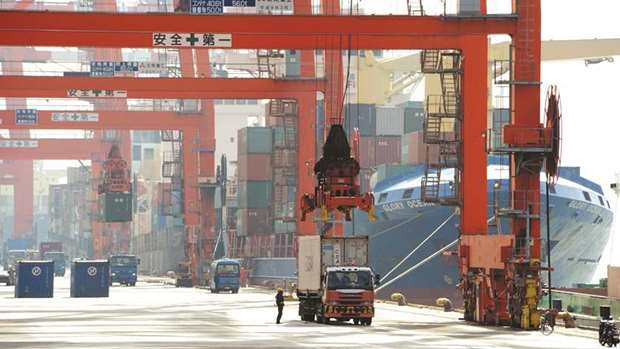Japan’s exports rose less than expected in March due to a strong yen, raising some concern about the outlook for shipments on top of anxiety over Washington’s criticism of the nation’s large trade surplus with the United States.
Yesterday’s trade data comes during a two-day summit between US President Donald Trump and Japanese Prime Minister Shinzo Abe that threatens to put Japan in the crosshairs of Trump’s protectionist trade policies.
While the trade surplus with the United States narrowed slightly by 0.2% year-on-year to ¥623.1bn ($5.82bn) in March, it was still sizeable enough to draw criticism from Trump. The backdrop of rising trade tensions, stoked by the bitter US-China tariff standoff, have roiled financial markets as investors worried about their impact on global growth.
Growth in export-reliant Japan could be undermined in the event of a hit to world trade, or if the United States seeks measures to lower its trade deficit with the world’s third-biggest economy. “Exports can continue to grow, because there is overseas demand for capital goods,” said Yusuke Ichikawa, senior economist at Mizuho Research Institute. “We need to watch for risks posed by trade policy, because there is a sense Japan will have to make some concessions to the United States.” In March, the data showed shipments grew 2.1% from the same period a year ago, below the 4.7% annual increase expected by economists in a Reuters poll.
In February, exports grew 1.8%.
The yen was 6.3% higher versus the dollar in March compared to the same period a year ago, finance ministry data showed. This weighed on the value of Japan’s exports. In volume terms, Japan’s exports rose 1.8% year-on-year in March, reversing a 2.1% annual decline in February, a reason to not become overly pessimistic, Ichikawa said. Exports in March were supported by an increase in shipments of cars, and semiconductor manufacturing equipment, the data showed.
Japan’s exports to the United Sates rose 0.2% year-on-year, much slower than a 4.3% annual increase in February. Since taking office last year, Trump has pushed to re-write free-trade deals to secure more protection for US exports and jobs.
The US president has imposed tariffs on steel and aluminium imports, which affect Japanese companies, and has also criticised Japan for its low number of US auto imports. At the summit with Trump, Tokyo is eager to avoid being pushed into talks on a two-way free trade agreement aimed not only at market access but at monetary and currency policies.
Japan’s exports to the European Union slowed sharply to a 0.3% annual increase in March from an 11.5% increase in February, which could raise some concern about demand from Europe. In one positive sign, Japan’s exports to China jumped 10.8% in March from a year ago, rebounding from a 9.7% decline in February as factories resumed operations after the Lunar New Year holidays. Economists expect Japan’s exports to expand at a slower pace than last year due to a tapering off in demand for semiconductors and electronic parts.

Trucks are seen transporting containers from a pier in Tokyo’s port. Japan’s trade surplus with the US narrowed slightly by 0.2% year-on-year to u00a5623.1bn ($5.82bn) in March, it was still sizeable enough to draw criticism from Trump.
